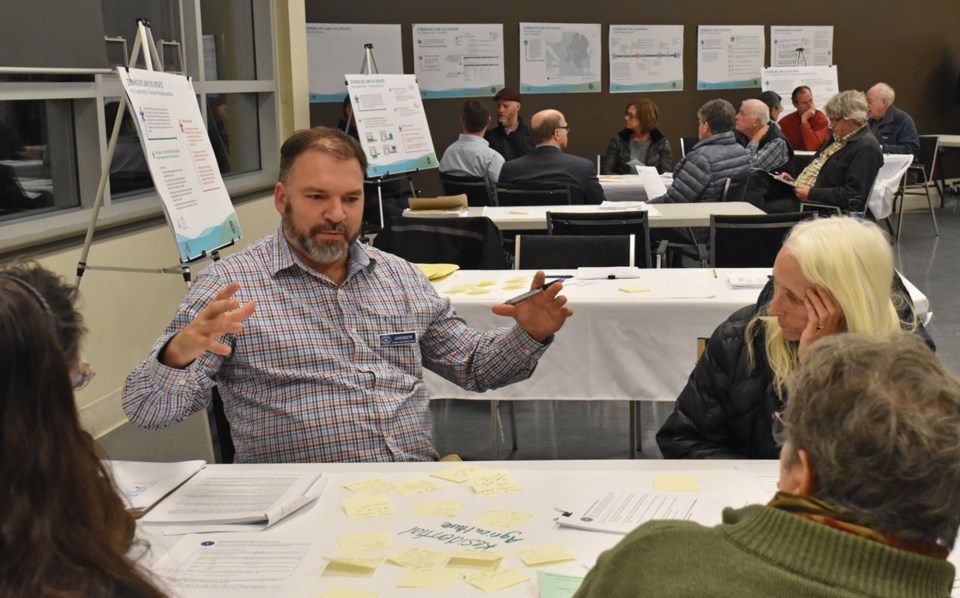The bylaw applies to all rural Sunshine Coast save for the Pender Harbour area. It regulates density and how land is used, from what can be built on it to what can be sold on it. And after nearly 30 years, Zoning Bylaw 310 is due for an update.
“Our communities are experiencing some new issues now, than even just five years ago, and so our zoning bylaw needs to be able to reflect the regulations needed for some of those issues,” said Julie Clark, a planner at the Sunshine Coast Regional District (SCRD).
Zoning Bylaw 310 covers West Howe Sound, Elphinstone, Roberts Creek and Halfmoon Bay and was adopted in 1989. And while it has been amended 170 times, this will be the bylaw’s first comprehensive update.
As part of that update process, the public was invited to offer input at a series of workshops held in Sechelt and Gibsons last week. About 75 people attended, along with most of the Sunshine Coast Regional District’s (SCRD) planning department.
The workshops were organized around a “key opportunity summary,” penned by technical writing consultants, The Arlington Group, also in attendance, and tasked with drafting the update.
On Dec. 6, about 20 people showed up to the Gibsons community centre for the last workshop of the series. Clark and planning manager Andrew Allen gave a brief introduction before attendees circulated through the several stations set up to identify those “key opportunities,” including housing diversity, residential agriculture, home-based business, energy efficiency and production, short-term rental accommodation and cannabis production and retail.
A cluster of people huddled around the housing diversity station most of the evening. Allen said it was the most popular station at all the workshops.
“People want to talk about affordability, they want to talk about creative options. How can you have a second dwelling on your property, a suite? They want to talk about tiny homes and cottages and affordable housing, so that’s really been the key draw,” he said. A revised bylaw could change regulations around secondary suites within dwellings, cottages, coach houses, duplexes, and different types and sizes of homes.
Allen also highlighted housing when asked to identify areas in need of updating. “There’s a huge amount of issues and pressure related to housing,” he said. Another he identified was the relatively new phenomenon of short-term rentals.
Another was food production.
The General Use Provisions section of the bylaw stipulates, for example, that those who keep livestock must do so “for the purposes of domestic use only” – which ruffles some residents’ feathers because they want to be able to profit from their poultry’s bounty.
“People really want to be able to sell eggs from chickens. They don’t want that to be illegal or unlawful,” Allen said.
Prior to the string of public workshops, planners consulted with advisory groups across the Coast and emerged with a report in October detailing their suggestions, such as the need to see the bylaw reflect the values of the six Official Community Plans in the coverage area.
An attendee on Thursday framed that issue around another of the evening’s popular topics: raising chickens and selling eggs.
“Roberts Creek has way different rules about chickens than Elphinstone… How are you going to determine which rules from which OCP are going to govern the entire bylaw?”
“That’s a challenge that we’ll have to address,” responded Allen.
The SCRD will be launching an online questionnaire for those who weren’t able to attend workshops, and will be hosting focus groups with stakeholders.
Once public and stakeholder input is gathered and synthesized, it will be used to inform the new draft, which is anticipated to come before directors by spring 2019.
More information about the bylaw can be found at the SCRD’s webpage or else by emailing [email protected] to request to be added to the email distribution list.



